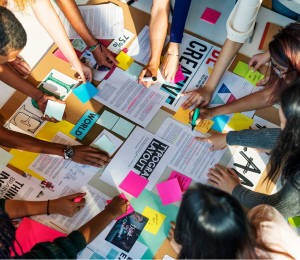An ecological model of dropout intention in university students during the covid-19 pandemic
Un modelo ecológico de la intención de deserción en estudiantes universitarios durante la pandemia por covid-19
DOI:
https://doi.org/10.17081/psico.26.49.5839Palabras clave:
abandono, teoría ecológica, estudiantes universitarios, entorno académico, COVID-19Resumen
Objective: To analyse the drop out intention of university students after six months of home confinement during the covid-19 pandemic using an ecological model.
Method: A non-experimental cross-sectional study with an intentional sampling of 1,011 active university students during 2020. Aged between 18 and 54 years (M = 22,6; SD = 4,8; female = 438). We evaluated them with the university dropout questionnaire for students, Depression, Anxiety and Stress Scale, Fear of covid-19 Scales, covid-19 Anxiety syndrome scale, and the Satisfaction with academic changes questionnaire. We performed a descriptive and multivariate analysis of the data.
Results: The model explain 28 % of drop out intention among university students during confinement by covid-19 (sensitivity = 86,8 %). Dissatisfaction with academic changes is the main predictor of the model (OR = 0,960; IC 95 % [0,950, 0,959). Other significant predictors are positive and negative interactions (i.e., in family, social, and academic environments), negative emotional symptoms, anxiety about covid-19, being older, studying at a private university, and having a family member diagnosed with covid -19.
Discussions: Macrosystem changes (i.e., home confinement and online classes) during the first six months of the covid -19 pandemic modified the students’ interaction with their proximal systems and new predictors of the intention to drop out emerged (e.g., anxiety about covid-19 and having a family member diagnosed with covid -19), associated with the context of confinement.
Descargas
Citas
Al-Dwaikat, T. N., Aldalaykeh, M., Ta’an, W., & Rababa, M. (2020). The relationship between social networking sites usage and psychological distress among undergraduate students during covid-19 lockdown. Heliyon, 6(12), e05695. https://doi.org/10.1016/j.heliyon.2020.e05695
Arana, R., Castañeda-Sound, C., Blanchard, S., & Aguilar, T. E. (2011). Indicators of persistence for hispanic undergraduate achievement: Toward an ecological model. Journal of Hispanic Higher Education, 10(3), 237–251. https://doi.org/10.1177/1538192711405058
Asenjo-Alarcón, J. A., Linares-Vásquez, O., & Díaz-Dávila, Y. Y. (2021). Nivel de estrés y estilos de vida en profesionanles enfermería durante la pandemia de covid-19. Revista Peruana de Investigación En Salud, 5(2), 59–66. https://doi.org/10.35839/repis.5.2.867
Bronfenbrenner, U. (1979). The ecology of human development: Experiments by nature and design. Harvard University Press.
Bronfenbrenner, U., & Morris, P. A. (2006). The Bioecological Model of Human Development. In Handbook of Child Psychology: Theoretical Models of Human Development (pp. 793–828).
Cao, W., Fang, Z., Hou, G., Han, M., Xu, X., Dong, J., & Zheng, J. (2020). The psychological impact of the covid-19 epidemic on college students in China. Psychiatry Research, 287, 112934. https://doi.org/10.1016/j.psychres.2020.112934
Chao, M., Chen, X., Liu, T., Yang, H., & Hall, B. J. (2020). Psychological distress and state boredom during the covid-19 outbreak in China: the role of meaning in life and media use. European Journal of Psychotraumatology, 11(1), 1769379.https://doi.org/10.1080/20008198.2020.1769379
Copeland, W. E., McGinnis, E., Bai, Y., Adams, Z., Nardone, H., Devadanam, V., Rettew, J., & Hudziak, J. J. (2021). Impact of covid-19 Pandemic on College Student Mental Health and Wellness. Journal of the American Academy of Child and Adolescent Psychiatry, 60(1), 134–141. https://doi.org/10.1016/j.jaac.2020.08.466
Debbarma, I., & Durai, T. (2021). Educational disruption: Impact of covid-19 on students from the Northeast states of India. Children and Youth Services Review, 120(January), 105769. https://doi.org/10.1016/j.childyouth.2020.105769
Eisenberg, D., Golberstein, E., & Hunt, J. B. (2009). Mental Health and Academic Success in College. B.E. Journal of Economic Analysis and Policy, 9(1), 1–37. http://www.bepress.com/bejeap/vol9/iss1/art40
Fu, W., Yan, S., Zong, Q., Anderson-Luxford, D., Song, X., Lv, Z., & Lv, C. (2021). Mental
health of college students during the covid-19 epidemic in China. Journal of Affective Disorders, 280, 7–10. https://doi.org/10.1016/j.jad.2020.11.032
Jones, R. (2017). The student experience of undergraduate students: towards a conceptual framework. Journal of Further and Higher Education, 42(8), 1040–1054. https://doi.org/10.1080/0309877X.2017.1349882
Li, H. Y., Cao, H., Leung, D. Y. P., & Mak, Y. W. (2021). The Psychological Impacts of a covid-19 Outbreak on College Students in China: A Longitudinal Study. International Journal of Environmental Research and Public Health, 17(11), 3933. https://doi.org/10.3390/ijerph17113933
Lohman, B. J., Kaura, S. A., & Newman, B. M. (2007). Matched or Mismatched Enviroment? The Relationship of Family and School Differentiation to Adolescents’ Psychosocial Adjustment. Youth and Society, 39(1), 3–32. https://doi.org/10.1177/0044118X06296637
Lovibond, P. F., & Lovibond, S. H. (1996). The structure of negative emotional states: Comparison of the depression anxiety stress scales (DASS) with the Beck depression and anxiety inventories. Behaviour Research and Therapy, 33(3), 335–343. https://doi.org/10.1016/0005-7967(94)00075-U
Mendoza, P., Malcolm, Z., & Parish, N. (2015). The Ecology of Stdent Retention: Undergraduate Students and The Great Recession. Journal of College Student Retention: Research, Theory & Practice, 16(4), 461–485. https://doi.org/10.2190/CS.16.4.a
Navarro-Roldán, C. (2022). Modelo ecológico para la detección temprana del riesgo de deserción en estudiantes universitarios. In C. Navarro-Roldán & P. Reyes (Eds.), Deserción Universitaria (pp. 149–194). Universidad de Boyacá.
Navarro-Roldan, C. P., & Zamudio, L. E. (2021). Cuestionario de riesgo de deserción universitaria (CDUe) basado en el modelo ecológico. Tesis Psicológica, 16(1), 1–28. https://doi.org/10.37511/tesis.v16n1a12
Nikčević, A. V., & Spada, M. M. (2020). The covid-19 anxiety syndrome scale: Development and psychometric properties. Psychiatry Research Journal, 292, 113322. https://doi.org/10.1016/j.psychres.2020.113322
Pandita, S., Govind, H., & Chib, S. (2020). Psychological impact of covid-19 crises on students through the lens of Stimulus-Organism-Response (SOR) model. Children and Youth Services Review, 120, 105783 Contents. https://doi.org/10.1016/j.childyouth.2020.105783
Pérez, C. A. (2020). Asociación Colombiana de Universidades presenta resultados de la encuesta “Los estudiantes tienen la palabra.” Universidad Del Cauca. https:// www.unicauca.edu.co/versionP/noticias/investigación/investigadores-de-unicauca-
y-productores-de-fresa-impulsan-el-desarrollo-de-cadenas-productivas
Ruiz, F. J., Martín, M. B. G., Falcón, J. C. S., & González, P. O. (2017). The hierarchical factor structure of the spanish version of depression anxiety and stress scale-21. International Journal of Psychology and Psychological Therapy, 17(1), 97–105. https://www.redalyc.org/pdf/560/56049624007.pdf
Sánchez-Teruel, D., Robles-Bello, M. A., & Valencia-Naranjo, N. (2021). Do psychological strengths protect college students confined by covid-19 to emotional distress? The role of gender. Personality and Individual Differences, 171, 110507 Contents. https://doi.org/10.1016/j.paid.2020.110507
Son, C., Hegde, S., Smith, A., Wang, X., & Sasangohar, F. (2020). Effects of covid-19 on college students’ mental health in the United States: Interview survey study. Journal of Medical Internet Research, 22(9), 1–14. https://doi.org/10.2196/21279
Soraci, P., Ferrari, A., Abbiati, F. A., Fante, E. Del, Pace, R. De, Urso, A., & Griffiths, M. D. (2020). Validation and Psychometric Evaluation of the Italian Version of the Fear of covid-19 Scale. International Journal of Mental Health and Addiction, 1–10.
Tinto, V. (1989). Definir la deserción: una cuestión de perspectiva. Revista de Educación Superior, 71(18), 1–9. http://publicaciones.anuies.mx/pdfs/revista/Revista71_S1A3ES.pdf
Vincentini, I. C. (2020). La educación superior en tiempos de covid-19. Aportes de la Segunda Reunión del Diálogo Virtual con Rectores de Universidades Líderes de América Latina. In Banco Interamericano de Desarrollo (BID). https://publications.iadb.org/publications/spanish/document/La-educacion-superior-en-tiempos-de-covid-19-Aportes-de-la-Segunda-Reunion-del-Diálogo-Virtual-con-Rectores-de-Universidades-Lideres-de-America-Latina.pdf
Wang, X., Hegde, S., Son, C., Keller, B., Smith, A., & Sasangohar, F. (2020). Investigating mental health of US college students during the covid-19 pandemic: Cross-sectional survey study. Journal of Medical Internet Research, 22(9), e22817. https://doi.org/10.2196/22817
Wild, S., & Heuling, L. S. (2020). Student dropout and retention: An event history analysis among students in cooperative higher education. International Journal of Educational Research, 104, 101687. https://doi.org/10.1016/j.ijer.2020.101687
Publicado
Cómo citar
Número
Sección
Licencia
Derechos de autor 2023 Claudia Patricia Navarro-Roldán, Sandra Milena Mateus Gómez, Helmer Andrés Avedaño Soto

Esta obra está bajo una licencia internacional Creative Commons Atribución 4.0.
Desde la revista Psicogente impartimos una política de respeto con nuestra comunidad científica incluyendo a nuestros autores. Los autores tienen derecho a un trato respetuoso y atento en el proceso Editorial, que las evaluaciones de sus artículos sean justas, imparciales (para ello la revista procederá con la evaluación doble ciego) y se realicen en un tiempo razonable. Se deberá mantener la confidencialidad y los permisos para proceder con la publicación. Todo cambio solicitado por parte del comité, los pares y el Editor deberán ser explícitos y claramente justificados. Especifica que los autores/as conservarán sus derechos de autor y garantizarán a la revista el derecho de primera publicación de su obra, el cual estará simultáneamente sujeto a la Licencia de reconocimiento de Creative Commons BY que permite a terceros compartir la obra siempre que se indique su autor y su primera publicación a esta revista.
Garantizamos un proceso editorial transparente: desde las acciones de recepción del articulo hasta la validación final del mismo, se hará en comunicación constante con el autor. Las modificaciones en el estado de los artículos, así como las diversas decisiones tomadas sobre él y los tiempos de ejecución empleados se realizarán haciendo uso de la plataforma OJS y de ser necesario en contacto directo a través del correo de autores y de la revista Psicogente. Así mismo se procura la escogencia de Pares revisores idóneos: con perfiles y experiencia que lleven a una avaluación de calidad de cada documento sometido a revisión.





